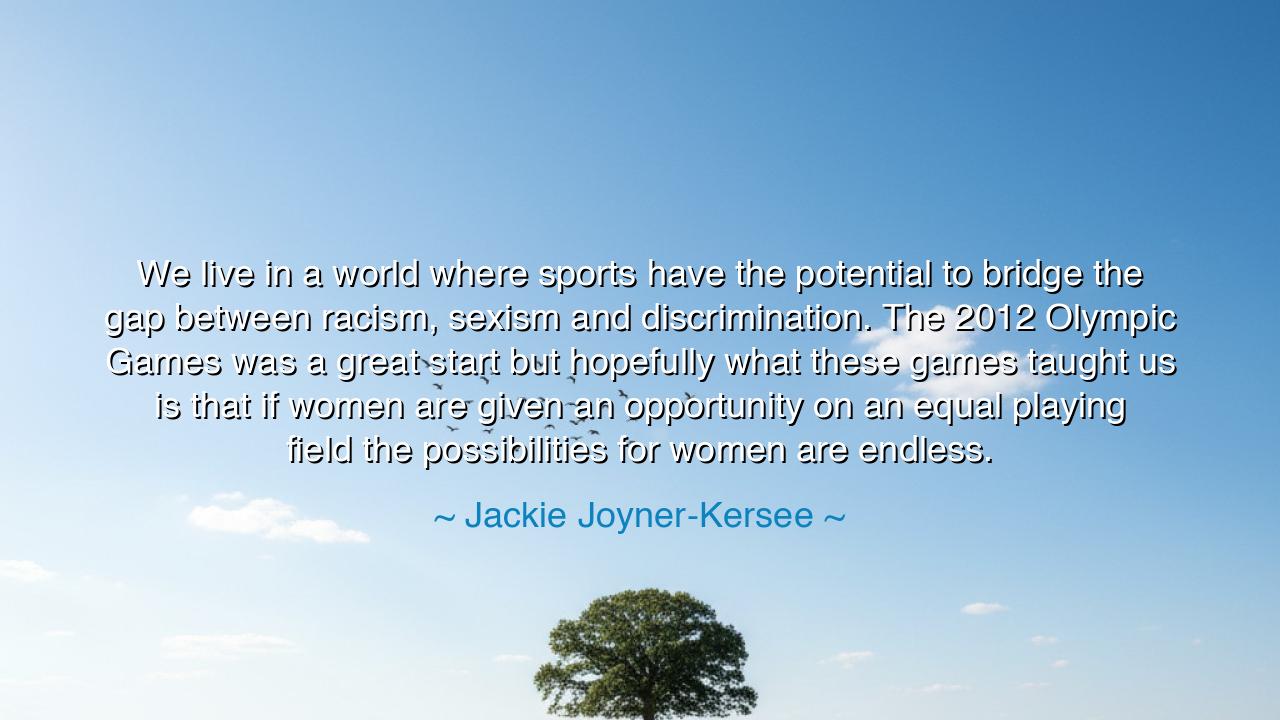
We live in a world where sports have the potential to bridge the
We live in a world where sports have the potential to bridge the gap between racism, sexism and discrimination. The 2012 Olympic Games was a great start but hopefully what these games taught us is that if women are given an opportunity on an equal playing field the possibilities for women are endless.






When Jackie Joyner-Kersee proclaimed, “We live in a world where sports have the potential to bridge the gap between racism, sexism and discrimination. The 2012 Olympic Games was a great start but hopefully what these games taught us is that if women are given an opportunity on an equal playing field the possibilities for women are endless,” she spoke as both champion and prophet. Her words are not only a reflection on the Games, but a declaration of the power of sports to tear down barriers that have divided humanity for centuries. She calls upon us to see sport not as mere contest, but as a sacred ground where justice can be lived, where equality can be tested, and where unity can be born.
The ancients themselves knew that the games could be a meeting place beyond division. At Olympia, warring Greek states laid down their arms in a sacred truce so that athletes might compete in peace. Though the world outside remained filled with conflict, within the stadium a glimpse of harmony appeared. Joyner-Kersee’s reflection on the 2012 Olympics carries the same spirit: that even in a fractured world, the arena of play can be a mirror of what humanity might become if equality and respect governed all things.
Her emphasis on racism, sexism, and discrimination strikes at the deepest wounds of human history. These forces have denied countless individuals the chance to rise, to compete, to show their gifts. But when the walls fall, and when a woman stands on the same starting line as a man, or an athlete of one color competes alongside another without bias, the world witnesses a vision of justice. In such moments, the playing field becomes not only a site of sport, but an altar of equality.
Consider the story of Wilma Rudolph, the African American sprinter who overcame childhood polio and poverty to win three gold medals at the 1960 Olympics. In a time when segregation still scarred America, her victories shattered stereotypes and became a beacon of hope for women and minorities alike. Her story illustrates Joyner-Kersee’s teaching: when the opportunity is given, the human spirit proves again and again that greatness is not bound by gender, race, or origin.
The 2012 Olympics were indeed a turning point, for it was the first time every participating nation sent women to compete. From Saudi Arabia to the United States, barriers were lowered and possibilities widened. The Games did not end the struggles of women, but they lit a torch for generations to follow: proof that equality in sport can be achieved, and once achieved, it transforms not only the field of play but the fabric of society itself.
The lesson is profound: if we would build a better world, we must build equal fields of opportunity. The chance to compete, to grow, to excel must not be bound by prejudice or tradition. Just as sport has shown what is possible, so too must our schools, our workplaces, and our nations. For the spirit of equality is not confined to the stadium; it is meant to flow outward, shaping every aspect of life.
Practically, this means supporting and celebrating women in sport, fighting discrimination wherever it appears, and ensuring that every child—regardless of race, gender, or class—can step onto the field with the same chance to shine. It means teaching that victories of justice are greater than medals, and that fairness is the truest crown an athlete can wear.
Thus, Jackie Joyner-Kersee’s words endure as a timeless teaching: sports have the power to unite, to heal, to reveal the boundless potential of women and men alike. Let us honor that power by giving equal opportunity, by breaking down every barrier, and by remembering that the playing field, when leveled, becomes a vision of the world as it ought to be.






AAdministratorAdministrator
Welcome, honored guests. Please leave a comment, we will respond soon